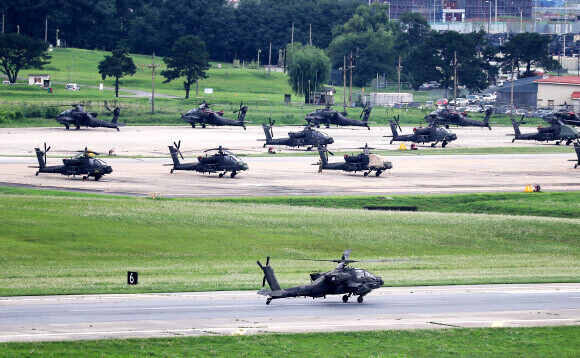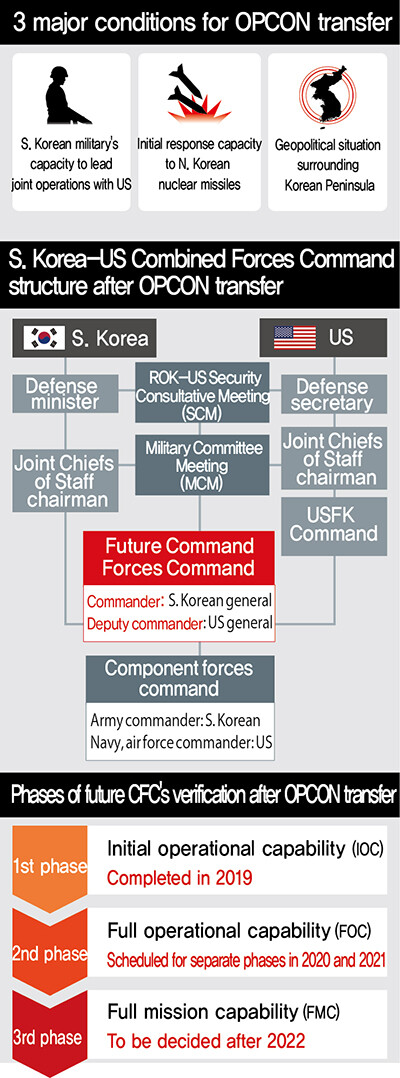hankyoreh
Links to other country sites 다른 나라 사이트 링크
OPCON transfer unlikely to happen during Moon’s presidency

Certain aspects of verifying the “full operational capability” (FOC) of the future structure of South Korea and the US’ Combined Forces Command (CFC) have reportedly been postponed until next year because of the COVID-19 pandemic. FOC represents the second phase of assessing the capability of the future CFC, which is supposed to be set up after South Korea regains wartime operational control (OPCON) of its forces from the US. The upshot is that there’s little chance of OPCON being handed over while South Korean President Moon Jae-in is in office.
“The South Korean and American militaries have decided to only carry out some components of FOC verification during the joint exercise they will carry out over the next two weeks and to carry out the remaining components next year,” a South Korean military source told the Hankyoreh on Aug. 11. That effectively means a delay of the second phase of assessment of future CFC capability, a prerequisite for the OPCON transfer.

Postponing the completion of the second phase of assessment until next year means that the third phase, which verifies “full mission capability” (FMC), originally scheduled for next year, will inevitably be delayed until 2022. South Korea and the US have agreed not to pursue the OPCON transfer until they’ve determined whether the requirements have been met following the three phases of assessment of the capability of the future CFC, which is supposed to be led by a South Korean general. As a consequence, delaying the third and final phase of that assessment would make it impractical to complete the OPCON transfer by May 2022, when Moon leaves office.
Moon promised while running for president that he would complete the OPCON transfer before leaving office. While the Moon administration adjusted the transfer timeline from “while in office” to “quickly through deliberations with the US,” it reportedly was still pushing to complete the transfer on the original timeline.
The primary factor disrupting that timeline was the COVID-19 pandemic. The spread of the novel coronavirus forced the cancelation of the joint exercise that South Korea and the US had planned for this spring and the scaling down of the summer exercise, which will be held on Aug. 16-28, following a crisis management drill on Aug. 11-14. But out of concerns over the spread of COVID-19, only a minimum of necessary staff will take part in the exercise, with the result that only some components of FOC verification will be carried out.
Lack of cooperation from US and resolution from S. KoreaOther factors are a lack of cooperation from the US and a lack of resolution in the South Korean government. When the push to complete the OPCON transfer before the end of Moon’s presidency encountered pushback during the South Korea-US summit in 2017, Seoul immediately backed down.
The two countries reportedly also came into conflict during their deliberations over this joint exercise. South Korea argued that the exercise should focus on the assessment of future CFC capability in order to move forward with the OPCON transfer, but the US military wanted the exercise to focus on joint readiness for the North Korean threat.
“Because of the US’ uncooperative attitude and COVID-19, the South Korean government thinks the OPCON transfer is unlikely to take place before the president leaves office,” a South Korean government official said.
By Park Byong-su, senior staff writer
Please direct comments or questions to [english@hani.co.kr]

Editorial・opinion
![[Editorial] Korea must respond firmly to Japan’s attempt to usurp Line [Editorial] Korea must respond firmly to Japan’s attempt to usurp Line](https://flexible.img.hani.co.kr/flexible/normal/500/300/imgdb/original/2024/0514/2317156736305813.jpg) [Editorial] Korea must respond firmly to Japan’s attempt to usurp Line
[Editorial] Korea must respond firmly to Japan’s attempt to usurp Line![[Editorial] Transfers of prosecutors investigating Korea’s first lady send chilling message [Editorial] Transfers of prosecutors investigating Korea’s first lady send chilling message](https://flexible.img.hani.co.kr/flexible/normal/500/300/imgdb/original/2024/0514/7917156741888668.jpg) [Editorial] Transfers of prosecutors investigating Korea’s first lady send chilling message
[Editorial] Transfers of prosecutors investigating Korea’s first lady send chilling message- [Column] Will Seoul’s ties with Moscow really recover on their own?
- [Column] Samsung’s ‘lost decade’ and Lee Jae-yong’s mismatched chopsticks
- [Correspondent’s column] The real reason the US is worried about Chinese ‘overcapacity’
- [Editorial] Yoon’s gesture at communication only highlights his reluctance to change
- [Editorial] Perilous stakes of Trump’s rhetoric around US troop pullout from Korea
- [Guest essay] Preventing Korean Peninsula from becoming front line of new cold war
- [Column] The state is back — but is it in business?
- [Column] Life on our Trisolaris
Most viewed articles
- 1Ado over Line stokes anti-Japanese sentiment in Korea, discontent among Naver employees
- 2[Column] Samsung’s ‘lost decade’ and Lee Jae-yong’s mismatched chopsticks
- 3Korean opposition decries Line affair as price of Yoon’s ‘degrading’ diplomacy toward Japan
- 4US has always pulled troops from Korea unilaterally — is Yoon prepared for it to happen again?
- 5Korean auto industry on edge after US hints at ban on Chinese tech in connected cars
- 6[Editorial] Yoon’s gesture at communication only highlights his reluctance to change
- 7[Correspondent’s column] The real reason the US is worried about Chinese ‘overcapacity’
- 8[Column] Will Seoul’s ties with Moscow really recover on their own?
- 9[Photo] Korean students protest US complicity in Israel’s war outside US Embassy
- 101 in 3 S. Korean security experts support nuclear armament, CSIS finds